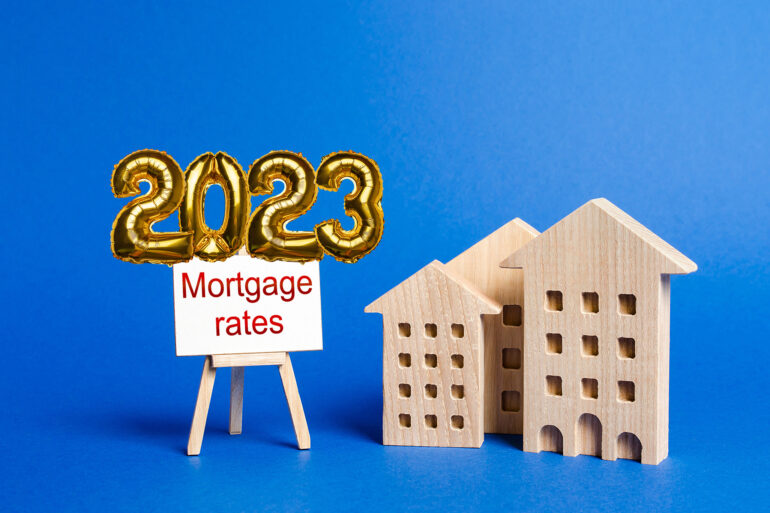Expert Predictions on Mortgage Rates for 2023
Mortgage rates are essential to any real estate investor. Higher interest rates mean it will cost more to borrow money to invest in properties, which can mean the difference between a profitable investment and one that eats up your profits.
So, what are mortgage rates likely to look like in 2023?
As we approach the end of 2022, many homebuyers and investors are wondering what the future holds for mortgage rates. With the housing market showing signs of recovery and the economy improving steadily, the question on everyone’s mind is: will mortgage rates continue to rise in 2023, or will they remain stable or even decrease?
Economic conditions, such as inflation and unemployment rates, can significantly impact mortgage rates.
In this blog post, we will explore the current state of the housing market, the factors that could impact mortgage rates in 2023, and the predictions of industry experts and analysts. We will also offer tips and advice for investors on how to prepare for potential changes in mortgage rates.
The Current State of the Housing Market and Factors Impacting Mortgage Rates:
The housing market has been on a rollercoaster ride in recent years, with record-low mortgage rates driving a surge in property sales and prices. However, the COVID-19 pandemic disrupted the market, leading to a slowdown in sales and a flattening of property prices.
According to the United States Case Shiller Home Price Index, existing property sales increased by at least 10% in September from September 2021. The median property price of houses sold in 2022 stood at $428,700.
So, what does the future hold for mortgage rates? The answer depends on several factors, including economic conditions, government policies, and the actions of the Federal Reserve.
Economic conditions, such as inflation and unemployment rates, can significantly impact mortgage rates. Inflation can drive up mortgage rates as lenders seek to protect themselves against the potential loss of purchasing power.
Government policies and regulations, such as changes to the mortgage interest deduction and the implementation of new lending standards, can also impact mortgage rates. For example, stricter lending standards could lead to higher mortgage rates for some borrowers.
Finally, the actions of the Federal Reserve, such as changes to the federal funds rate, can affect mortgage rates. The federal funds rate is the interest rate at which banks lend money to each other overnight, and changes to this rate can impact the rates offered by mortgage lenders.
Not all experts agree on the direction of mortgage rates in 2023.
Expert Predictions on Mortgage Rates for 2023:
This year, we’ve seen mortgage rates rise steadily in anticipation of the Federal Reserve’s next rate hike. The Fed has indicated that it may raise rates three more times this year, and mortgage rates are following suit.
However, mortgage rates may not continue to rise at their current pace because they’re still relatively low by historical standards. According to Forbes, mortgage rates are currently hovering around 6.78% for a 30-year fixed loan, a 15-year fixed is at 6.07%, and a 30-year jumbo is at 6.80%.
So, what do the experts predict for mortgage rates in 2023? According to the latest forecast from Freddie Mac, the average 30-year fixed-rate mortgage is expected to average 5.4% to 6.4% in 2023.
However, not all experts agree on the direction of mortgage rates in 2023. Some believe that rates will continue to rise, driven by economic recovery and increased inflation. Others believe that rates will remain stable or even decrease, as the Federal Reserve continues to support the economy through low-interest rates.
For example, Lawrence Yun, Chief Economist at the National Association of Realtors, predicts that mortgage rates will be near 7% by the end of 2023, as the economy recovers and inflation picks up. On the other hand, Matthew Speakman, an economist at Zillow, is uncertain about the future of mortgage rates due to factors, such as inflation and geopolitical and economic uncertainty as the Federal Reserve continues to support the economy.
If you’re shopping for real estate, it’s important to understand how much your monthly payment will be when you consider all the costs associated with owning commercial or residential real estate.
That includes property taxes and insurance, but also things like maintenance costs. We recommend using our calculator (available for our premium members on Property Onion) to get an estimate of what your monthly payment could look like if you were approved for a loan today based on the information we have available to us.
You can learn more about mortgage rate predictions for 2023 from our educational section dating back to July 2022.
Regardless of the direction of mortgage rates in 2023, real estate investors need to be prepared for potential changes.
What Affects Mortgage Rates?
Several factors can affect mortgage rates, including:
- The state of the economy: Economic indicators, such as gross domestic product (GDP) growth, unemployment rates, and inflation, can impact mortgage rates. When the economy is strong, demand for loans tends to be higher, which can lead to higher mortgage rates. On the other hand, when the economy is weak, demand for loans is often lower, which can lead to lower mortgage rates.
- Inflation: Inflation is the rate at which the prices of goods and services increase over time. When inflation is high, it can lead to higher mortgage rates because lenders want to be compensated for the loss of purchasing power that comes with inflation.
- Federal Reserve policies: The Federal Reserve, also known as the central bank of the United States, sets monetary policy, including the federal funds rate. This is the interest rate at which banks lend money to each other overnight. When the federal funds rate is high, it can lead to higher mortgage rates because lenders need to be compensated for the higher cost of borrowing money.
- International events: Global economic and political events can also affect mortgage rates. For example, if there is a financial crisis in another country, it can lead to increased demand for safe assets, like U.S. government bonds, which can push down mortgage rates. On the other hand, if there is a lot of uncertainty in the global economy, investors may be more hesitant to take on risky assets like mortgages, leading to higher mortgage rates.
- Supply and demand: The balance of supply and demand in the housing market can also impact mortgage rates. If there is a lot of demand for real estate but a limited supply, it can lead to higher mortgage prices, leading to higher mortgage rates.
Tips for Investors to Prepare for Changes in Mortgage Rates:
Regardless of the direction of mortgage rates in 2023, real estate investors need to be prepared for potential changes. Here are some tips to help you manage your mortgage payments and minimize the impact of rising rates:
- Start by getting pre-approved for a mortgage. This will help you understand how much you can borrow and what your monthly payments will be, which can be useful for budgeting and decision-making.
- Keep an eye on market trends and economic indicators. Changes in the broader economy can impact mortgage rates, so it can be helpful to stay informed about factors that may affect interest rates in the future.
- Consider a shorter-term mortgage. Shorter-term mortgages typically have lower interest rates, so you may be able to save money on interest by choosing a 15-year mortgage instead of a 30-year mortgage.
- Talk to a financial advisor. A financial advisor can help you understand the implications of changes in mortgage rates and provide guidance on how to prepare for them.
- Shop around for the best mortgage rates: Don’t settle for the first mortgage rate you come across. Compare offers from multiple lenders to find the best rate for your situation.
- Consider a fixed-rate mortgage: A fixed-rate mortgage offers the stability of a consistent monthly payment, even if mortgage rates rise. This can help you plan and budget more effectively.
- Make a larger down payment: A larger down payment can help you qualify for a lower mortgage rate, as it reduces the amount of money you need to borrow.
- Consider refinancing: If you have an existing mortgage, consider refinancing to a lower rate. This can save you money on your monthly payments and reduce the overall cost of your mortgage.
- Monitor your credit score: Your credit score can impact the mortgage rates you are offered, so it’s important to monitor and maintain a good credit score. Pay your bills on time, reduce your debt, and avoid applying for new credit.
When Should I Lock My Mortgage Rate?
Deciding when to lock in a mortgage rate is a personal decision that depends on various factors.
When deciding when to lock in a mortgage rate, consider these key factors:
- The current state of the housing market: If the housing market is strong and demand for property is high, mortgage rates are likely to rise, and it may be a good idea to lock in a rate to avoid paying higher interest in the future.
- Your financial situation: If you are in a good financial position and have a good credit score, you may be able to negotiate a lower mortgage rate with your lender. In this case, it may be a good idea to lock in a lower interest rate.
- The length of time until you plan to close on the property: Most mortgage rates are locked in for a specific period, typically 30, 45, or 60 days. If you are close to closing on the property and your rate is set to expire soon, it may be a good idea to lock in a new rate to avoid paying higher interest.
Overall, the best time to lock in a mortgage rate is when you are ready to buy a property, have found a mortgage lender willing to offer you a competitive interest rate, and feel confident that your financial situation is stable.
Plan for the Future
As you can see, mortgage rates could affect your real estate investing business in 2023.
It’s essential to keep an eye on real estate trends to ensure that your property investment portfolio is strategic and viable, and if you are considering buying a foreclosure to flip or selling your foreclosure to make a profit, it is always wise to keep on trend with current interest rates.








